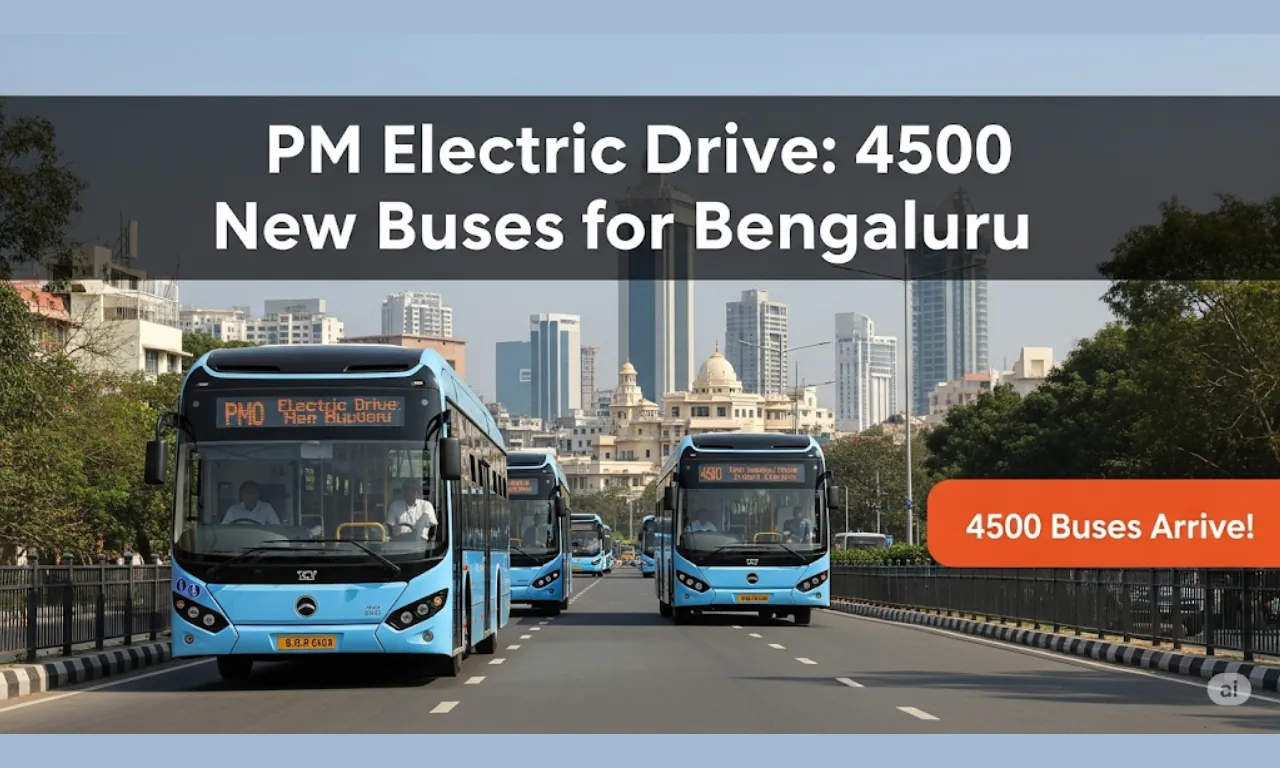- Bengaluru gets 4,500 electric buses under the Pradhan Mantri Electric Drive Scheme, moving towards sustainable and low-carbon urban transport.
- The rollout includes big upgrades like electrifying bus depots and adding solar-powered charging stations.
- Emphasis on gender-friendly, accessible public transport backed by private companies and community participation.
PM Electric Drive Scheme has recently given 4,500 electric buses to Bengaluru, marking a big move towards cleaner, sustainable urban travel in Karnataka’s capital. This scheme is set to change Bengaluru’s public transport by cutting pollution and supporting low-carbon travel, matching the city’s goal for greener and more inclusive mobility.
What 4,500 Electric Buses Mean for Bengaluru’s City Travel
Getting 4,500 electric buses through the PM Electric Drive Scheme will greatly improve commuting in Bengaluru. This large electric fleet will lower the city’s dependence on private vehicles, which often cause heavy traffic jams and pollution. Electric buses run quietly and without emissions, helping improve air quality and create a healthier city. Since Bengaluru is a major IT center, adding more sustainable transport will help reduce commuter stress, especially in busy areas like Electronic City and Manyata Tech Park.
How Bengaluru is Rolling Out the EV Buses Under the PM e-Drive Scheme
Bengaluru’s electric bus rollout follows a purchase plan by Centre-owned Convergence Energy Services Ltd (CESL) using the Gross Cost Contract (GCC) model. This approach shifts business risks to private operators while guaranteeing service quality linked to performance. The tender covers both buying buses and setting a schedule to deploy the fleet by March 2026, aiming for an organized and efficient launch. State and central officials are working together closely to meet this deadline and address urgent commuter needs.
Building the Charging Infrastructure Needed
Adding 4,500 electric buses calls for strong upgrades in infrastructure. Plans include electrifying bus depots, installing fast and dependable charging stations, and using renewable energy like solar power to support operations. Teams are working to upgrade Bengaluru’s power grid and set up backup power systems at depots to keep bus services running smoothly. This infrastructure will strengthen the electric transport system and improve how well the buses operate.
How Electric Buses Help Build Sustainable and Inclusive Transport
Electric buses offer big environmental benefits—less pollution, lower noise, and less use of fossil fuels. Besides these benefits, the scheme focuses on inclusiveness by making sure bus designs are friendly to all genders. Routes, timings, and interiors are planned so boarding is easy for elderly and differently-abled passengers, with safer travel times and fair ticket prices. This approach makes public transport safer and more convenient for women, children, seniors, and blue-collar workers alike.
Challenges and How They’re Being Addressed
While promising, some challenges need careful handling. Infrastructure readiness, especially power supply at bus depots, is a concern. Officials are actively upgrading electrical systems and focusing on using renewable energy to ease these issues. Continuous monitoring of bus performance and commuter feedback will help spot any problems early, allowing quick fixes to keep services running well.
Private Sector Role and Engaging the Community
This project’s success also depends on strong backing from private companies. Like the Tata-Siemens partnership for Pune Metro, private firms are expected to bring innovation with branded electric buses, GPS tracking, Wi-Fi, and easy-to-use digital apps for commuters. Community outreach and listening sessions will collect feedback to improve services. Clear information about service quality and fares will build trust and encourage more people to use the buses.
With all these efforts, Bengaluru is set to lead India’s move to sustainable, fair, and future-ready city transport. Bringing in 4,500 electric buses under the Pradhan Mantri Electric Drive Scheme is a bold move towards clean mobility, setting an example for other cities to follow.

